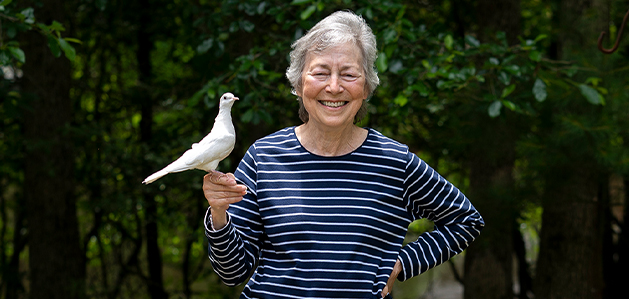10 Reasons To Schedule Your Colonoscopy Today
About 1 in 3 Americans who should be tested for colorectal cancer have never been screened. Here are 10 reasons why you should probably schedule your colonoscopy today.

By Keith Meslin, MD, Virtua Colorectal Surgeon
If you’ve been afraid or embarrassed to have a colonoscopy, here are 10 reasons why you should reconsider scheduling this life-saving screening.
- Not enough people are screened for colorectal cancer. About one in three Americans who should be tested for colorectal cancer have never been screened. Colonoscopies are recommended for:
- Everyone age 45 and older.
- Younger people who have had a first-degree relative with onset of colorectal cancer at or before age 50. In these cases, the screening should take place at the age of onset for that relative minus 10 years. So, if your father developed colorectal cancer at age 45, you should start screening at age 35. If the family member was older than age 50, then you should have your first colonoscopy at age 40.
- You can have colorectal cancer and not have any symptoms. A sudden and consistent change in bowel movements, unexplained anemia, as well as rectal pain and bleeding, are the most common symptoms, but some people won't notice any changes until cancer is in a later stage.
- Screening is important for various types of cancer, but especially colorectal cancer. During the screening, doctors can find and remove early polyps long before they become cancerous tumors. In fact, a small polyp could take five to 10 years to turn cancerous. This is what makes colorectal cancer extremely preventable—and preventive screening extremely important.
- As with all cancers, the sooner colorectal cancer is diagnosed, the better the chances a person can live a longer life, with a better quality of life.
- As with many other serious health conditions, people appear to be at a greater risk of developing colorectal cancer if they’re obese, eat a diet high in red or processed meats, consume too much alcohol, smoke cigarettes, or don't exercise regularly.
- Even in its later stages, colorectal cancer is easier to treat than it was in decades past because of advances in surgical techniques and new chemotherapy agents.
- In both men and women, colorectal cancer is the third most commonly diagnosed cancer. About one in 20 Americans will be diagnosed with colorectal cancer at some point in their lives.
- For reasons that aren’t fully understood, men are more than likely than women to be diagnosed with and die from colorectal cancer. This does not mean women should be any less concerned about their risk, however.
- For reasons that aren’t fully understood, African Americans have the highest colorectal cancer incidence and mortality rates of all racial groups in the U.S.
- A colonoscopy is an outpatient procedure that’s performed while you’re under sedation so there’s no discomfort. There are other testing options available, but these don’t definitively rule out any growths in the colon and often still require a colonoscopy if any abnormality is found.
Don’t put off this life-saving screening. To schedule your colonoscopy today, call 888-847-8823.
There's So Much More to Explore
Discover expert insights, inspiring stories, health tips, and more by exploring the content below!

10 Reasons To Schedule Your Colonoscopy Today
About 1 in 3 Americans who should be tested for colorectal cancer have never been screened. Here are 10 reasons why you should probably schedule your colonoscopy today.
Is an At-Home Colon Cancer Test a Good Alternative to a Colonoscopy?
Over age 45? Here’s what you need to know about colonoscopies and how they compare to non-invasive colorectal cancer screening tests.

The HPV Vaccine: A Powerful Shield Against Cervical Cancer
Learn about HPV, its link to cervical cancer, and how vaccines can protect against infection. Discover why early vaccination and regular screenings are vital for prevention.

How Does Breast Density Affect Your Mammogram?
The FDA now requires all U.S. mammogram centers to notify women about their breast density score. Here's what to know about breast density.

Breast Cancer Diagnosis Inspires Catherine to Help Others
The Penn Medicine | Virtua Health Cancer Program provided complete treatment to help Catherine overcome breast cancer—and inspired her to assist others going through the journey.

Put Your Mammogram Appointment on the Top of Your To-Do List
Can’t remember the last time you had a mammogram? You're in good company. At least 1 in 4 eligible women don’t get regular breast screenings. Learn why you should schedule your mammogram today.
Firefighter's Successful Lung Cancer Care at Virtua
Thankfully, Jerry paid attention to his lingering cough and as a result, got the expert care needed to treat his lung cancer.

A Breast Self-Exam Saved Kristen's Life
When Kristen Davidson found a lump in her left breast, she immediately called her doctor. Her quick action and the efforts of the Penn Medicine | Virtua Cancer Program team led to successful treatment.

Protect Your Child From HPV and Related Cancers
The HPV vaccine can protect your child from a cancer-causing sexually transmitted disease. An appointment with your pediatrician can get the process started.

Early Treatment is Best to Relieve Hemorrhoid Symptoms
Hemorrhoids are a problem not many want to discuss. Some may even avoid seeking professional help because of embarrassment. Learn about the treatments.

What to Know About Cervical Cancer Screenings
While cervical cancer screening guidelines advise that women need less frequent Pap smears, you still need annual pelvic exams. Learn more.
6 Tips for an Easier Colonoscopy Prep
What people dread most about a colonoscopy is the preparation (or "prep") you must do beforehand. These tips take the angst out of the prep and ensure an effective screening.

Rectal Cancer Surgery Gets Eileen Back to her Magical Life | Virtua Health
Life’s been one big adventure Eileen Giammona. So when a colonoscopy revealed rectal cancer, the Virtua team made sure it wouldn’t slow her down.
Robotic Surgery Helps Shelly Haney Return to Her Happy Place
Shelly had a total hysterectomy via a robotic surgery procedure for endometrial cancer. She was pain free one day later, and able to return to her favorite activities within three months.

New Technology Precisely Marks Suspicious Breast Lumps Before Biopsy to Ease Patient Anxiety
To alleviate breast biopsy anxiety, Virtua breast surgeons use GPS-like and radar technologies to pinpoint suspicious lumps for breast cancer testing.
3 Changes You Can Make Today to Lower Your Cancer Risk
The American Cancer Society released new guidelines for how changes in your diet and physical activity can significantly lower your risk for cancer. Start today with these tips.
Master 3 Mens Health Issues
Men are wired to work hard and provide for those around them. But, in doing so, it's possible to miss health issues that can stifle performance. Here's what to watch.
Personalized Breast Cancer Treatment Puts Choice In Womens Hands
Breast cancer treatment is as individual as the woman who receives it. This is how treatment is being personalized to a woman's lifestyle, fears and family needs.
Radiosurgery Delivers Targeted Treatment for Brain Tumors
Penn Medicine | Virtua neurosurgeons and radiation oncologists offer stereotactic radiosurgery (SRS) to pinpoint brain tumors and deliver targeted radiation treatment.
Seeing a Social Worker at the Hospital
Find out more about a social worker's role in your cancer care.
Start Reducing Your Cancer Risk Today
Take steps to reduce non-hereditary risk factors for cancer.
Call Your OBGYN if You're Bleeding After Menopause
Menopause puts a welcome end to monthly periods. However, the waning hormones that end your period also put you at risk for endometrial cancer. Here's what you need to know.
Know Your Endometrial Cancer Treatment Options
If you’ve been diagnosed with endometrial cancer, this information can help you prepare to discuss your treatment options with your care team.
Robot Helps Spot Lung Cancer Early
Robot-assisted bronchoscopy is the latest tool used by specialists with Virtua’s Comprehensive Lung Program to diagnose and treat lung cancer.
6 Healthy Habits to Start in Your 20s for Better Lifelong Health
These expert tips will help you establish healthy habits in your 20s that can help you crush your health goals now and in the future. Get started today.
Restoring Appearance and Spirit After Breast Cancer
The Penn Medicine | Virtua Cancer Program offers women in South Jersey resources to feel their best after breast cancer surgery, including implants, DIEP flap reconstruction, and more.
4 Essential Cancer Screenings
How do you know what cancer screenings to have and when? This guide outlines the appropriate times for four types of routine screenings to reduce your risk.
How to Overcome Colonoscopy Fears
Are you avoiding making an appointment for a colorectal screening? Here are some good reasons to get over your fear and take time for this quick test.
What You Need To Know About Cancer And COVID 19 Risks
A Virtua Health medical oncologist explains why it's vital to take precautions to protect yourself from COVID-19 if you've had cancer or are currently being treated for it.
Prostate Cancer Screening: What You Need to Know
Is prostate cancer screening right for you? According to Virtua primary care physician Amit Bhalodia, DO, here’s what you need to know.
Military Veteran Pam Carpino Offers Hope to Women With Triple Negative Breast Cancer
Pam received her breast cancer diagnosis shortly before the pandemic started. Now, she wants to be a resource for other women diagnosed with cancer.
Reclaim Your Strength and Spirit After Breast Cancer
After breast cancer treatment has ended, physical therapists help women return to normal as they rebuild their bodies—and strengthen their spirit.
The Cardio Oncology Team Protects Your Heart During Cancer Treatment
Cardio-oncology combines the expertise of cardiologists and oncologists to help protect the hearts of people undergoing cancer treatment. Learn more.
Coping with Body Changes After Breast Cancer Treatment
Breast cancer treatment can result in many physical changes, which can affect your self-esteem and how you view yourself. Read this advice on how to cope.
How Doctors Determination and Dancing Helped Judy Stokes Through Breast Cancer Treatment
Judy Stokes and her doctors credit her monthly breast self-exam with saving her life. Read her advice for all women.
How Is Breast Cancer Diagnosed?
Once you or your healthcare provider find a suspicious area in your breast, it will be necessary to do further testing or to conduct a biopsy.
